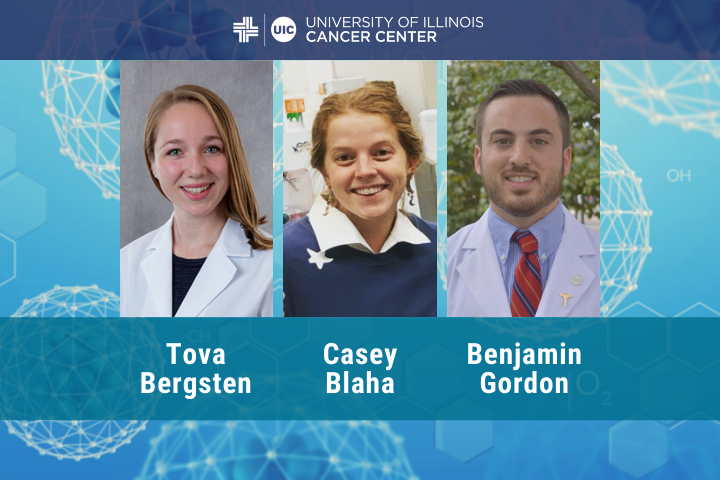
Three University of Illinois Chicago Medical Scientist Training Program (MSTP) students became teachers at the Society for Integrative Oncology’s 18th Annual International Conference, leading a workshop featuring a program they helped develop that connects the scientific and advocacy communities.
The “Survivors Advising Scientists Educational Program” (SASEP) was designed to address a lack of accessible educational materials to explain complex scientific and cancer health-related topics to people who need them, such as patients, survivors, and advocates. The program was designed to help address this concern, said Casey Blaha, who along with Tova Bergsten and Benjamin Gordon, created the educational training videos.
“We believe that patient investment in their own scientific education may help improve not only their own engagement in their personal health care, but it also may encourage greater outreach, advocacy, and cancer-related research initiatives in the future,” Blaha said.
The three students pre-recorded the workshop, titled “Understanding the Science Behind Integrative Oncology: Patient Advocate Perspective Workshop Proposal,” which was viewed by attendees virtually and in-person at the conference site in Baltimore. The UIC students stressed the importance of the program, how it was developed, and the impact it has caused for those who have used it. Attendees also viewed three modules: “Cancer Hallmarks Part I and Part II” and “How to Read a Scientific Poster.”
Following the presentation, Blaha hosted a live virtual question and answer session about the different types of questions participants may ask the scientific community based on the knowledge they gained from the modules. The workshop ended with an exercise in practicing how to read a scientific poster.
Since the students began working together nearly 18 months ago on the SASEP program, they have developed several eight- to 12-minute video vignettes on topics ranging from scientific hypotheses and its components; experimental and confounding variables; experimental errors; types of clinical studies; and how to read a scientific poster. A group of cancer patients, survivors and advocates review and provide input into the modules prior to their final production so they have broader appeal to laypeople.
The students worked with the patient advocates to create a scientific poster for the conference, Blaha said.
“We work well together as a team, sharing ideas and constantly learning from each other. The work is not only rewarding, but fun. Different questions are always asked during our discussions with one another, questions that may not have been thought of otherwise.
“Hopefully our work can help spread the impact of this bidirectional education to others. Being part of the Survivors Advising Scientists Educational Program and directly witnessing its impact, I hope to continue to work with patient advocates in the future, both in education and in my research,” Blaha said.
